Protein is essential for optimal health. Without protein, there can be no bodybuilding. In fact, protein is such a vital component of human nutrition that we cannot survive without it let alone hope to grow new muscle mass. Simply put, protein is a major constituent of all our cells in our bodies.
With regard to food for vegan bodybuilding, additional physical effort in the form of strength or endurance training mandates an increase in the daily amount of protein required for recovery and regeneration including the additional growth of muscle cells.
Protein can also positively affect our hormones because some of our hormones are actually made of protein themselves (polypeptide hormones). In a nutshell, protein is not just for bodybuilding; protein help maintain our health.
Vegan athletes however, are a particular case of bodybuilding in terms of nutrition, since they avoid getting their protein from animal sources. Some folk believe that vegan bodybuilding is unhealthy or even impossible. This couldn’t be further from the truth. There are numerous famous vegan bodybuilders and athletes, including Frank Medrano, Erin Fergus, Torre Washington, Patrick Baboumian, Dani Taylor, Barny du Plessis or the late bodybuilding legend Jim Morris. And the list can go on for quite a while…
The key to following a vegan bodybuilding diet is combining the right protein sources so that the overall amino acid profile includes all essential amino acids. It is basic human biology which teaches us that you don’t specifically need to eat animal proteins to grow new muscle.
Besides that, a vegan diet is super high in healthy and essential micronutrients such as vitamins, minerals and antioxidants that cannot readily be found outside plant based foods.
First Class and Second Class Proteins
A crucial aspect of vegan bodybuilding is keeping track of high-quality, complete sources of protein (often referred to as first class) and those that are incomplete or second class. The difference consists in the amount of amino acids (AAs) that are offered by a particular food.
Complete proteins contain all of the 9 essential AAs (Isoleucine, Phenylalanine, Lysine, Leucine, Threonine, Valine, Histidine, Tryptophan and Methionine). They are essential because the human body cannot synthesise these from other AAs, making them indispensable and a major priority for our nutrition.
Most sources of protein contain a percentage of those 9 essential AAs, but not all of them contain enough of everything. For example, vegans will find obtaining the right amount of Lysine a bit tricky if they do not frequently eat complete sources of plant-based protein. Among the latter are most legumes such as soy and soy products (soy “meats”, tempeh, tofu, soy milk, etc), beans (black, kidney, pinto, garbanzo, fava, navy, etc.), chickpeas (and related products like falafel, hummus, etc.) peas, lentils, cashews, pumpkin seeds, quinoa or peanuts.
If one’s diet does not feature proper variety, especially in the case of vegans, it is highly likely that a deficiency may set in with regard to the essential AAs. Relying on too few sources of incomplete proteins impedes bodybuilding progress and may lead to slow or incomplete recovery after training, missing on the potential for growth in terms of size and strength, higher chances of injury. This is easily remedied by combining at least two or three incomplete sources of protein; bingo – you have a complete protein!
6 Vegan Friendly Plant-Based Complete Protein Meal Combos
Sources of incomplete protein can be mixed together or with legumes to obtain the necessary 9 essential AAs. Here are 6 meal combos that offer complete protein.
Side-note – they don’t need to be eaten together, the components of these meals can be split and eaten on separate meals, as long as it is during the same day.
Hummus on Whole-Wheat Pita/Bread
Wheat and rice protein are similar in that they both lack the necessary amount of lysine. Fortunately, hummus is made of chickpeas, which are part of the legume family and they contain hefty amounts of it. Thus making hummus and whole-wheat pita a power packed complete protein a tasty treat for any vegan bodybuilder
Tasty tip: Hummus goes amazing with oven-baked corn, potato or vegetable chips! Add some avocado sauce and it becomes great party material in terms of hors d’oeuvre.
Rice and Beans
Rice and beans is an age old popular classic which must be one of the quickest and easiest complete protein meal combos you can make! Simply combine your favorite rice (brown, white, wild, etc.) with some beans. Kidney beans are usually widely available in canned form, while also being highly affordable, although my preference would be black beans due to their superior amino acid profile.
Tasty tip: For a more complex flavor, the rice can be improved by a sauté of 2 cloves of garlic, one red onion, a celery stalk and a bell pepper.
Lentil Tacos
Lentil tacos can make up a perfect meal for breakfast or even for a meal on the go, which is why they are a popular choice for diners and food trucks offering vegan options. A bit of sautéed garlic and onion in your favorite vegetable oil, together with some vegetable broth, makes up for the best way to simmer those lentils into a delicious pack of flavor.
Tasty tip: When putting the tacos together, add a bit of seasoned coleslaw underneath the mixture and salsa sauce on top. Mouth-watering!
Roast Vegetable and Buckwheat Salad
Salads are easy and fun to make, not to mention delicious with the right ingredients. Buckwheat can be toasted in a pan and then simmered down in some water or veggie broth. When it’s done and drained, refresh it under some cold water before adding it to some oven-baked veggies - zucchini, baby carrot, eggplant, red onion etc.
Tasty tip: Serve the final dish with some parsley and dress it with wine vinegar and a tiny bit of maple or agave syrup.
Ezekiel Bread
One of the best types of protein bread one can eat by far is Ezekiel bread. It is usually made from organic, whole grains that are allowed to sprout, which greatly improves their nutritional composition. There is no added sugar, but it does contain gluten, since it is a combination of wheat, millet, barley, spelt in terms of grains, as well as soy and lentils in terms of legumes. This complete protein dish is an amino acid powerhouse.
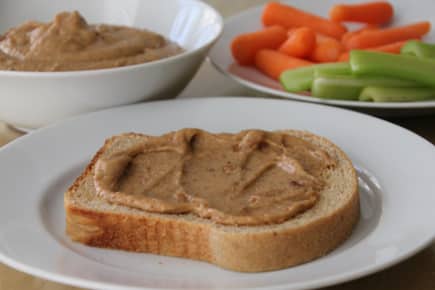 Peanut Butter with Bread
Peanut Butter with Bread
When time is of the essence, peanut butter on bread also makes up for the 9 essential AAs. Using whole-wheat, seed and oat or Ezekiel bread definitely improves the amount of protein, minerals and vitamins in the snack, whereas some sliced banana on top provides for a sweet delight.
There are numerous varieties of meal combos that bring together two or more incomplete sources of protein to make up for the entire range of essential AAs, besides the ideas mentioned above. Feel free to experiment with any of the common nuts and seeds, cauliflower, amaranth and quinoa in combination with any grain to get those 9 essential AAs. The best part is that they involve little effort to make.
Just how much plant-based protein do vegan bodybuilders need?
Both the U.S. FDA and the European EFSA authorities on nutrition recommend a daily amount of no less than 0.8 g of protein per kilogram of body weight for an adult. However, the Northern American ADA, ACSM and DoC published a joint paper in 2009 recommending between 1.2 and 1.4 g for endurance athletes and between 1.2 and 1.7 g for strength training, whereas vegetarians were prompted to consume 10% more, so between 1.3 and 1.8 g/kg/day. This is at least 50% more than the RDA.
For an adult of 75kg (165 lbs), this is what the recommended DA and the breakdown of AAs looks like:
References:
- Plant protein does not need meat to be complete: http://circ.ahajournals.org/content/105/25/e197
- FDA: https://www.accessdata.fda.gov/scripts/InteractiveNutritionFactsLabel/protein.html
- EFSA: https://www.efsa.europa.eu/en/press/news/120209
- Table of Nutritional References and athlete protein requirements: http://veganhealth.org/articles/protein.php
- More about complete protein from plant sources: http://goaskalice.columbia.edu/answered-questions/complete-and-incomplete-proteins-grains-and-vegetables and http://www.uen.org/Lessonplan/preview.cgi?LPid=1269
Here's more valuable information for vegan athletes and vegan bodybuilders:


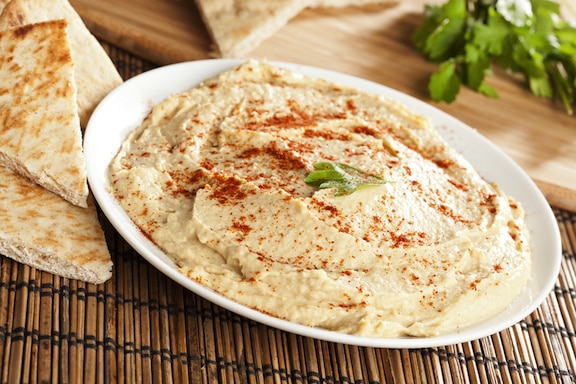
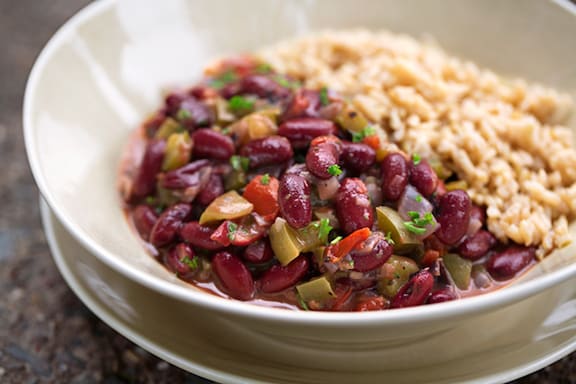
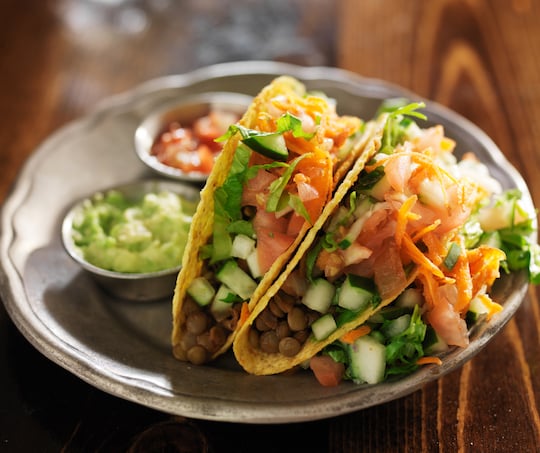
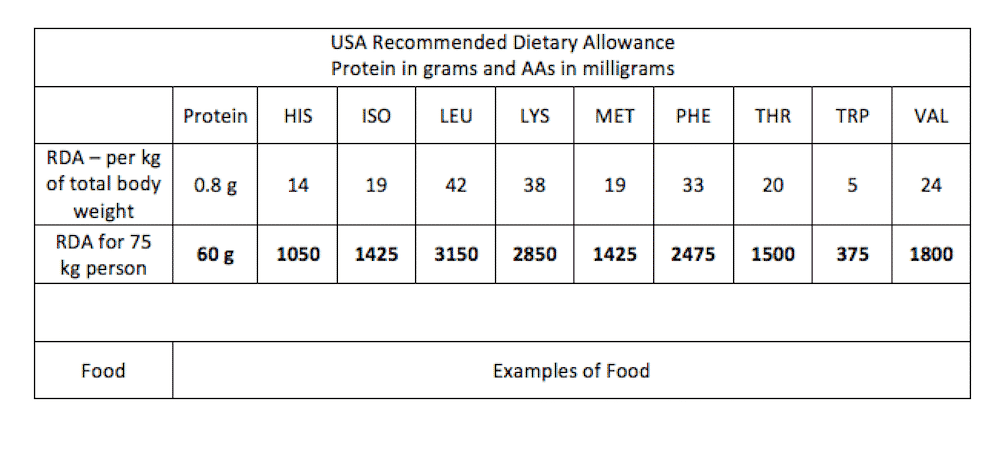
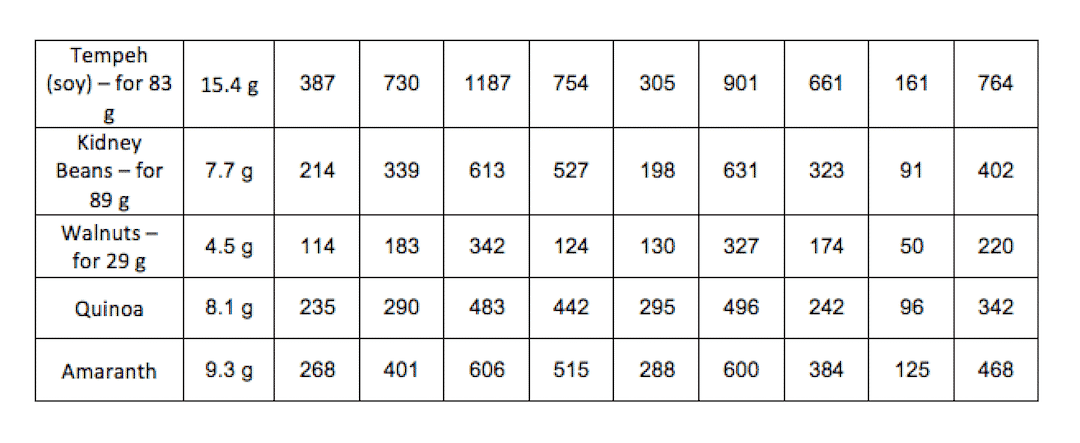

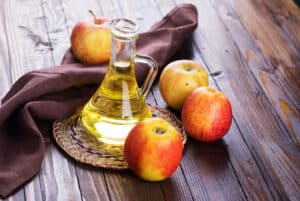
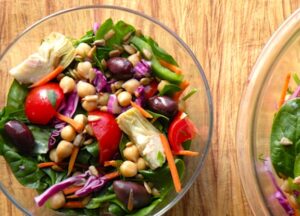
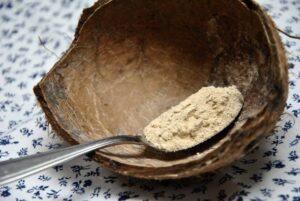
Comments
No Comments